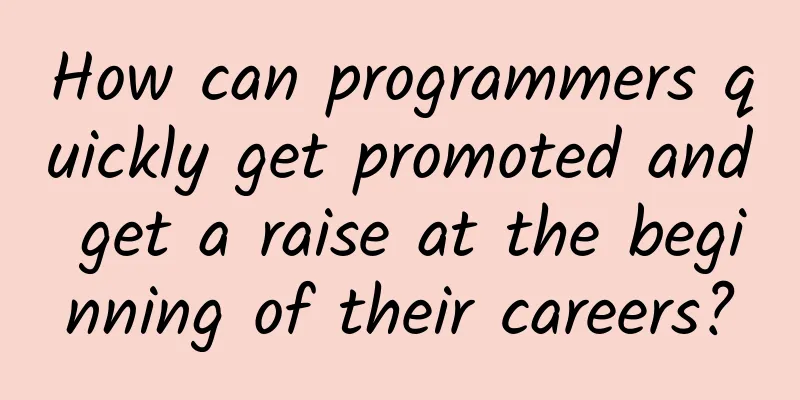How can programmers quickly get promoted and get a raise at the beginning of their careers?

|
In a mature medium or large organization, professionals will have different technical level promotion channels, such as Tencent and Baidu's T series, Alibaba's P series, etc. Some publicly introduced Tencent job levels are as follows. Tencent's job level system has 26 career channels. If you are a graduate with no professional skills, you can start from any of these 26 channels, such as administration, finance, design, operation and maintenance, development, operation, product, etc., and practice, fight monsters and upgrade until you earn tens of millions of dollars a year. It is like a complete life guide. The horizontal axis is 26 career channels, each with different professional skills, and the vertical axis is 4 major levels. Through the setting of job levels, most employees do not need to change jobs. They can obtain higher levels in their existing positions through their own technical improvement and project contribution, thereby obtaining salary increases, recognition of professional ability and personal professional reputation. The job levels of large companies are usually widely recognized by the industry and can actually be transferred between multiple companies. Therefore, programmers can obtain a long-term growth channel without changing their jobs. The lack of a clear growth channel is also a dilemma for many small companies to retain employees. In small companies, due to the lack of a transparent and stable job level channel and a supporting salary system, a large number of senior employees have left. If the company has a suitable promotion channel, engineers have the opportunity to be promoted from their current level to a higher level every year. In most companies, high-level promotions will be conducted by a review panel composed of relevant authoritative experts of the company (usually the company's technical committee); low-level promotions can be decided by the employee's direct or cross-level superiors. The scenarios discussed in this article are mainly promotions that require approval from the review panel and candidates need to defend. It requires candidates to have higher comprehensive abilities, professional influence, presentation skills, and logical expression skills. The end of each year is also the time for promotion assessments in most companies, so this article discusses views on various promotion issues. This article mainly discusses the situation of programmers, but the same applies to all technical jobs such as testing, operation and maintenance, and other professional positions such as product managers. Q: How to write application materials for promotion? When you think about how to write promotion materials, it means that you have already got the opportunity for promotion, which is not an easy opportunity in many companies. Management usually only selects some outstanding personnel from the list of qualified personnel for promotion nomination, so when your superior communicates this opportunity with you, it means that you have already stepped half a foot into a new level. Promotion is nothing more than evaluating whether the candidate's professional ability meets the technical requirements of a higher level. Candidates need to prove that their technical ability has been improved to a higher level through their contributions to projects, such as business value, technical achievements, and technical influence. Both project contribution and technical improvement are indispensable, so promotion materials mainly revolve around these two centers. Intermediate promotions mainly depend on the performance and contribution of the position. High-end positions can be summarized as company-level experts and industry experts. Company-level experts refer to those who are proficient in the core technologies related to the company's business, have good accumulation in related fields, and have made unique contributions. Industry experts need to have relevant professional abilities that are industry-leading, and their professional abilities should preferably belong to the company's core technologies. Q: What are the evaluation criteria for each level? Like most companies, each technical level will have relevant requirements, such as technical ability, influence ability, collaboration ability, etc. During the review stage, the jury will evaluate the candidates according to the requirements. In practice, there are also many methods that use benchmark comparison. The judges collectively select several employees with the lowest ability, medium ability, and high ability at the corresponding level, and compare them with the applicant. If the applicant is among these benchmarks, normally he should be around the middle ability person, then the candidate is considered qualified. If the candidate is below the minimum ability, then the candidate is considered not qualified to apply for the corresponding position. The more well-known evaluation standard in the human resources field is Hay's evaluation method, which is applicable to all job levels. It is said that Huawei directly introduced Hay's job level system. The easiest way to understand the level of programmers in Internet companies is to distinguish them in the following ways (such as Tencent, Sina and other companies): Level 1: Able to complete work under the guidance of others; (Junior Engineer) Level 2: Able to independently complete common tasks required by the business; (Engineer) Level 3: Able to plan and complete common business projects and guide others to complete them; (Senior Engineer/Technical Expert/Architect) Level 4: Company and industry experts; (Chief Architect/Scientist) At the operational level, each level will be further divided into several sub-levels. Of course, this division method is only based on a certain dimension. In reality, there are more factors to consider, and most of them will fall into Hay's system. Many companies do not have clear and detailed requirements for each level. If candidates are not sure of the specific requirements for higher-level positions, they can refer to the benchmark comparison method above and examine the differences between themselves and higher-level personnel to prepare their own promotion materials. Q: What are the benefits of promotion? Get salary and other benefits increase. The more formal the company, the more strictly the salary range corresponds to the job level, and each employee's salary will fall within the salary range of their job level. Although there are some individuals whose salary does not match the job level range due to the special nature or scarcity of their positions. Therefore, for most people, upgrading their job level is the most natural way to get a salary increase. In addition, in most companies, benefits such as stock options require employees to meet a certain job level threshold to obtain them, such as meeting the conditions of Level 3 in the above classification. Promotion within the company will naturally bring better recognition of professional ability and personal professional reputation; some important projects are usually led and guided by high-level professionals, and high-level personnel usually have more opportunities for experience. Promotion can also gain prestige and recognition in the industry. The job levels of large companies are usually widely recognized by the industry. When changing jobs, you can at least get a similar job level in another company. Q: What is the weight of technical ability and non-technical business ability in technical promotion? Technical ability or non-technical business ability is a question that judges and management are entangled in. There are many cases where candidates can complete job tasks very well and work actively, but they are slightly inferior in technology and progress slowly. Usually management hopes that such people can be promoted. After all, these people are very necessary to achieve business tasks. But from another perspective, technical promotion is not a project contribution ranking. In principle, candidates need to have obvious technical improvements and be able to use a deeper understanding of technology to improve efficiency or carry out technological innovation to better solve future problems. Moreover, in the industry, the salary and grade of technical personnel (non-management positions) are also determined by the level of technical ability, so judging whether there is an improvement in technical ability is a rigid condition for whether a candidate can be promoted. Q: How do you view the contradiction between business capabilities and technical capabilities? Some teams may have people who are separated from the business to research technology and are indifferent to participating in projects. Researching technology purely out of the business environment of the company is controversial in most organizations. If these people's technical capabilities have been significantly improved, will it bring some negative problems if they continue to be promoted, such as inducing other engineers to separate from the business to research technology. Therefore, a better way is to judge whether the candidate has demonstrated technical improvement through project contributions. In this way, people who leave the company environment to fight monsters will naturally have no place to survive. In addition, from the perspective of fairness, management can set promotion entry conditions, such as performance must reach a certain excellent score or above. Q: Can a direct superior decide whether a subordinate is promoted? In most companies, for candidates at lower levels, direct superiors and cross-level superiors can exert greater influence, and most decisions can be made by direct or cross-level superiors. The higher the level of promotion, the smaller the role of the direct superior, and the review is usually conducted by a company-level expert group. Therefore, in their daily work, students at higher levels need to better balance the relationship between the requirements of their superiors and a reasonable technical architecture, have as much independent thinking ability as possible, make more contributions to technology-driven projects, and further demonstrate their technical achievements. Q: What questions do the judges like to ask during the judging process? The difficulty of the project is mainly used by the judges to judge the candidate's ability to deal with complex problems. Since it is a technical defense, candidates should focus on solving major technical problems as much as possible. Regarding the technical contribution to the project, candidates usually describe how they participated in the project through the project progress, but the judges are more concerned about the candidate's technical output and technical content. The principle of personal contribution in the project is the same as above. Many candidates have participated in some star projects of large companies, so they are more confident in the promotion defense. However, if they only do some auxiliary execution work in large projects, they usually will not get much recognition, but will create the impression that the materials are false and empty. Q: How do you view the judges’ difficult questions? Candidates should introduce their projects in a simple way and describe their achievements as objectively as possible. When asked difficult and questioning questions, try not to be defensive, do not try to rationalize the shortcomings of your project, and calmly accept the shortcomings seen by the judges. Q: Issues that candidates tend to overlook during the review The ability to guide and influence others. In an organization, a lone ranger may not be well received. It is easier to be recognized and welcomed if you help and lead the technical staff around you to grow together. Contributions beyond job requirements. Being able to complete work according to job requirements can only meet the qualified level. Taking the initiative to think and complete work beyond job requirements is more likely to get a high score. Q: I work very hard and often work overtime. Will I definitely get a promotion? There is no direct relationship. The evaluation mainly focuses on the improvement of technical ability, technical contribution and achievements obtained through technology. It has no necessary relationship with whether one works hard or overtime. Of course, hard-working people usually achieve better growth by investing more time in the technical field, so they have a greater chance of promotion. Q: I am recognized as the one with the strongest technical ability in my team, and even some people with higher positions in other departments are not as capable as me. Will I definitely be promoted? The failure probability of this type of case is still quite high. The key point is whether the candidate's recent projects can fully demonstrate the capabilities required of a high-level position. If the candidate has done a lot of odd jobs recently, even if he or she has strong technical capabilities, it will be difficult to get a passing score. Q: I just graduated, how can I get a quick promotion? Fresh graduates should learn basic knowledge, be willing to learn, participate in practice, and play a greater role in work. Don't deliberately pursue promotion. Promotion is more of a accompaniment of ability rather than a goal. If you have the above qualities and habits, even if you are not recognized in the current company, you can achieve it in another environment. It is just a matter of time. Q: What should I do if I am not good at presenting and expressing myself in public? Most judges also come from a technical background, so they don't particularly care about presentation skills. On the contrary, overly fancy presentation materials will cause judges to be disgusted. But on the other hand, the hierarchical relationship of the presentation materials and the logic of the cause and effect relationship of the argument need to be clearly expressed. Judges will not mind candidates reading from a script, but they will mind the confusion of the material structure and logic. Q: What kind of mentality should one have towards promotion? Promotion is often a game of too many people and too little porridge, and the values of the judges may be singular. In the limited review time, considering whether the preparation is sufficient, the candidate's understanding of the review focus, etc., not every candidate can get a suitable presentation. It is also difficult for the judges to fully understand the candidates in a short period of time, so whether the candidate passes the review or not may not fully reflect the candidate's ability. The most important thing for candidates is to adjust their mindset, "not be happy with things, not be sad with themselves", understand what their core values are concerned about (see my article Methods of choosing learning goals and natural laws), put more energy into the things they care about, and produce corresponding results and influences, which is much more meaningful than a promotion result. Promotion review can be regarded as a career ladder game, and there are many cases where people who have been promoted have nothing to achieve afterwards. In most cases, whether you pass the promotion or not is just a loss of salary, which will not affect your output; it will not affect your productivity, and it will not affect your achievements. Candidates need to clearly understand and stick to their goals in order to achieve greater success in personal ability, career, and personal influence. |
<<: 4 issues that determine the success or failure of Google Play in China
Recommend
Why does bottled water expire but well/tap water doesn't?
In our impression, water has always existed on th...
Apple iOS's closed system has created an unknown gray industry chain
At the end of 2015, with the imprisonment of Xu, ...
Be careful with your password! Another surprising bug in iOS 8
As the use of mobile devices becomes more widespr...
Android Studio 3 supports Java 8, but do you dare to use it?
Recently, Google released AS 3.0 and a series of ...
A series of courses on fine-tuning the operation of Doudian's no-source store group, helping beginners with zero foundation to start their own business in Doudian, worth 888 yuan
A series of courses on the refined operation of Do...
This seemingly free attitude towards life is killing your sense of being alive...
When I woke up on the weekend, a class invitation...
Latest news, expected in 2027!
Recently, Yi Rong, chief designer of the Long Mar...
What should I do if the bidding promotion effect is not good? Why does your bidding promotion burn money quickly but has poor effect?
In fact, the fundamental problem is the lack of t...
APP promotion tips: 101 website promotion methods
People often ask me how to promote a website? Tod...
Dismantling the operation and promotion strategies of 360, Xiaomi, WeChat and Oasis
What I will share today are the product operation...
Huawei App Market search keyword promotion!
1. Introduction to search keyword promotion As on...
MIT reveals the Earth's "self-rescue" mechanism, which takes hundreds of thousands of years at a time
Currently, climate change has become an “invisibl...
Why are there still green trains today? Why are the train bodies green?
This article is about 6230 words Reading time: 17...
8 ways to make money with Taoke APP!
This year, the number of friends engaged in Taoba...
Operations uncle: Personality labels became popular in the circle of friends overnight and WeChat was blocked again! So who achieved success?
Here's what happened: Back on July 14, Plato ...









